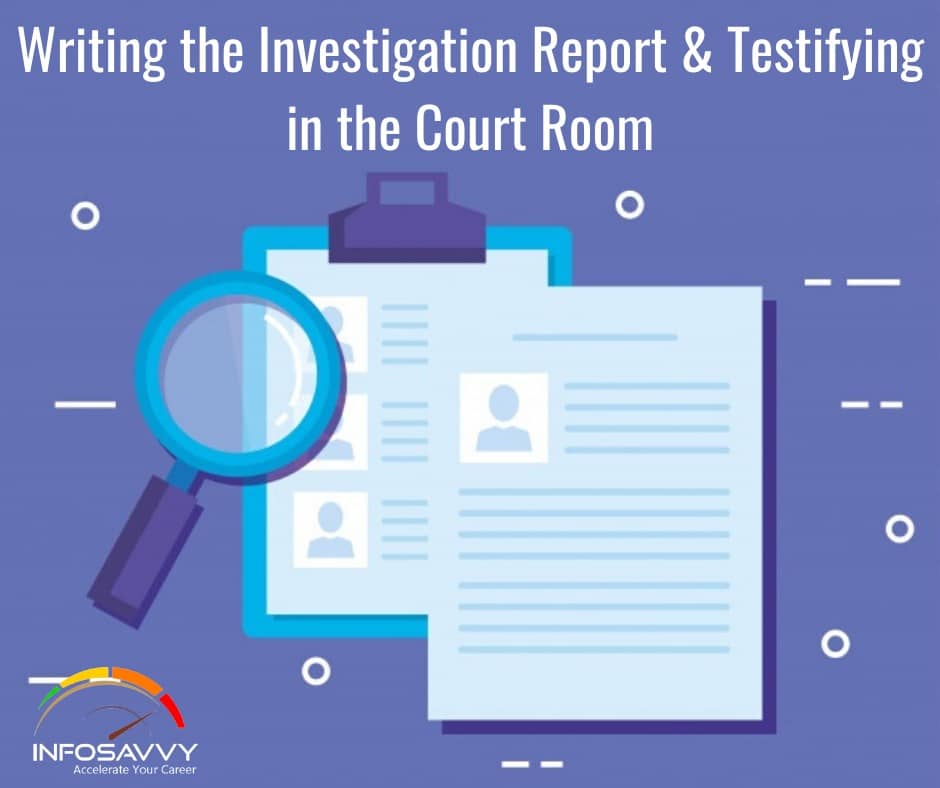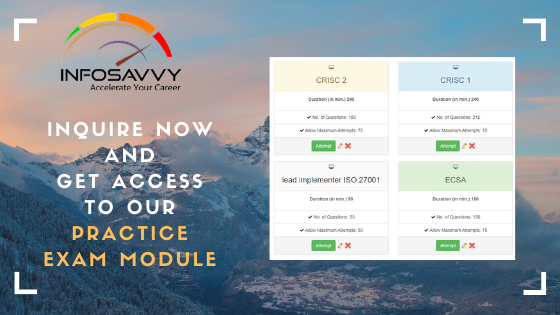In this article explain Writing the Investigation Report , Testifying in the Court Room & Closing the Case in detail.
Writing the Investigation Report
Report writing is a crucial stage in the outcome of the investigation, as it summarizes all the investigation process into a readable report, presented to a court of law. Based on the accuracy and certainty of this report, the court will prosecute the suspects.
The report should be clear, concise, and written for the appropriate audience. The report should be in local language if necessary and have no jargons. It should include only include the data related to the case and the evidence. Every statement should have a supporting document or evidence.
Information included in the report section is:
- Purpose of Report: Explain the objective of the report, the target audience, and the reason for preparing the report clearly. Mention how the evidence supports or denies the claims and provide sufficient backup to the statements.
- Author of Report: Include a list of all the authors and co-authors of the report, including their positions, responsibilities during the investigation, and their contact details.
- Incident Summary: Introduce the incident and explain its impact; the summary should explain clearly what the incident was and how it occurred.
- Evidence: Provide descriptions of the evidence acquired during the investigation, location, status during extraction, extraction procedure, analysis process, tools used, etc. Mention each detail clearly and in such a way that the process is explicable to the people with less or no technical knowledge.
Related Product : Computer Hacking Forensic Investigator
Writing the Investigation Report (Cont’d)
Details
- Provide a detailed description of what evidence was analyzed and the analysis methods that were used and also explain the findings of the analysis.
- List the procedures that were followed during the investigation and any analysis techniques that were used.
- Include proof of your findings, such as utility reports and log entries. Conclusion
- Summarize the outcome of the investigation.
- Cite specific evidence to prove the conclusion.
- The conclusion should be clear and unambiguous. Supporting Documents
- Include any background information referred to throughout the report, such as network diagrams, documents that describe the computer investigation procedures used, and overviews of technologies that are involved in the investigation.
- It is important that supporting documents provide enough information for the reader to understand the incident as completely as possible.
Computer Forensics Investigation Methodology
As the attorney, prosecutors, and other panel present in a court of law may be unaware of the technical knowledge regarding the crime, evidence and losses, the investigators should approach authorized personnel who could appear in the court to affirm the accuracy of the process and the data.
Also Read : Data Analysis & Evidence Assessment
Expert Witness
An expert witness is a person who has a thorough knowledge of a subject and whose credentials can convince others to believe his or her opinions on that subject in a court of law. Courts call upon the expert witnesses to authenticate the facts and witnesses during any complex case. Cases involving accidents and deaths often need the help of an expert witness to verify the severity of injuries and mode of death. Whenever there is a case of probability in any criminal case that juries and attorneys cannot understand clearly, they cad for the advice of an expert witness, who can clarify the facts and help the court come to a decision. Expert witnesses cross-examine witnesses and evidence, as a normal witness may influence or manipulate the truth under many other factors.
The role of an expert witness is to:
- Investigate a crime
- Evaluate the evidence
- Educate the public and court
- Testify in court
- Conduct investigations on behalf of the court and report the findings back to the court
- Participate in court-appointed expert witness conferences to study any intriguing incident
- Educate the jury, court, and the individuals related to the case about his or her findings
The role of the expert witness in bringing evidence to court is to
- Assist the court in understanding intricate evidence
- Aid the attorney in determining the truth
- Truthfully express his or her expert opinion, irrespective of others’ views and influence
Testifying in the Court Room
An expert witness must keep certain factors in mind while testifying in court. The expert witness must have complete information about the usual procedures during a trial. He or she must never question the attorney regarding these matters. The attorney will first introduce the expert witness to the court. The witness will then offer his or her credentials and accomplishments to establish credibility with the jury. Presenting digital evidence to the court requires knowledge of new, specialized, evolving, and sometimes complex technology.
The following things take place in a court room:
- The Judge explains the usual procedures followed during a trial
- The attorney introduces the expert witness
- The opposing counsel may try to discredit the expert witness
- The attorney leads the expert witness through the evidence
- Later, the opposing counsel performs a cross-examination
Closing the Case
After evidence analysis and retrieval, the investigator should prepare a final report, which should include what the investigator did and found. Basic reports should be able to answer questions like who, what, when, where, and how of the evidence. In a good computing investigation, the steps can be repeatable and the results obtained are the same throughout.
The report should explain the computer and network processes and the inner working system.
The investigator should document all the proceedings related to the investigation properly, which will help to use the report as proof of findings in a court of law. Since the reader can be a senior personnel manager, a lawyer, or a judge, explanation for various processes provide the inner workings of the system, and its various interrelated components.
Each organization has its predefined template for report writing. Follow the template and understand the organization’s needs and requirements while describing the findings. Attach the log files generated by the forensic tool with the formal report, as they keep track of all the steps taken and support the findings of the evidence in court. The narrative part should precede the log in the report based on the fact finding.
Maintaining Professional Conduct
The rules that help you maintain professional conduct while investigating a case are:
- Be trustworthy and honest.
- Contribute to society and behave well,
- Avoid harming others.
- Give appropriate credit for intellectual property.
- Be fair and take action not to discriminate.
- Respect the privacy of others.
- Honor confidentiality.
- Honor copyrights, property rights, and patent rights.
- Acquire and maintain professional competence.
- Accept and provide appropriate professional review.
- Consider all the available facts that relate to the crime scene.
- Update software and computer hardware, networking, and forensic tools with the latest technical changes.
- Try to maintain quality, effectiveness, and dignity in the process and products of professional work.
- Keep the case confidential.
- Honor agreements, contracts, and assigned responsibilities.
- Respect the existing laws pertaining to professional work.
- Maintain the chain of custody.
- Avoid external biases to maintain the integrity of fact-finding in all investigations.
- Increase understanding of computers and the consequences of misusing them in public.
- Access computing and communication resources only after getting permission.
- Supervise personnel and resources in order to design and build information systems that improve the quality of working life.
- Support and acknowledge proper and authorized users of an organization’s computing and communication resources.
- Conduct sessions in the organization to advise about the principles and limitations of computer systems.
Questions related to this topic
- What must forensic scientist know to testify as an expert witness?
- How to Writing the Investigation Report & Testifying in the Court Room?
- What has to happen for a witness to be considered an expert witness?
- Who is responsible for interviewing witnesses at the crime scene?
- What are the three standards used by the courts when deciding to accept expert witness testimony?
- Explain Writing the Investigation Report & Testifying in the Court Room?
This Blog Article is posted by
Infosavvy, 2nd Floor, Sai Niketan, Chandavalkar Road Opp. Gora Gandhi Hotel, Above Jumbo King, beside Speakwell Institute, Borivali West, Mumbai, Maharashtra 400092
Contact us – www.info-savvy.com



